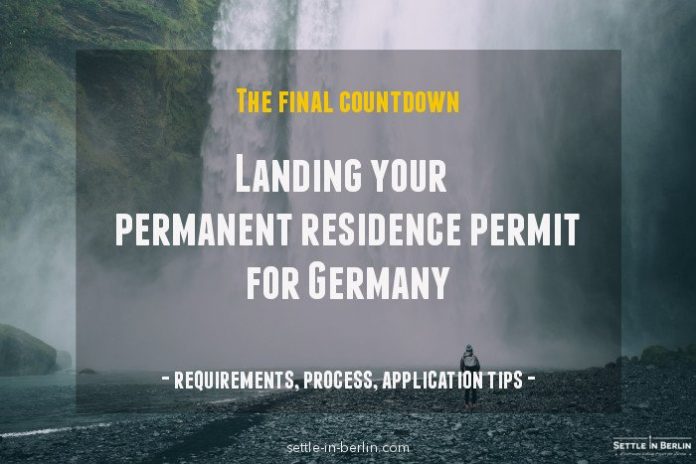If you are working or studying in Germany, then you are likely aiming towards permanent residency, maybe even citizenship down the line. However, you can only become a German permanent resident and get a Settlement Permit if you fulfil a set of requirements.
The German permanent residence permit known also as Settlement Permit and is issued only after you have lived and worked in Germany for a specified period of time – usually four years, but certain visa types allow you to apply for permanent residence quicker.
How Long Until I Can Become a German Permanent Resident?
The period of time you have to live in Germany before you get a Settlement Permit depends on your current residential status. As such, you can become a German permanent resident:
- After four years if you are a skilled worker.
- After four years if you are a researcher.
- After two years if you are a skilled worker with a German university degree or vocational training.
- After 33 months if you are an EU Blue Cardholder. If you are an adequate speaker of the German language, you can get the Settlement Permit after 21 months.
- After three years if you are self-employed.
- After five years if you are a freelancer.
- After three years if you are the family member of a German national.
- After five years if you are in Germany as an asylum seeker or refugee. The period can be shortened to three years if you can speak German well and are able to earn your own living.
German Permanent Residency Requirements
In addition to residency time, to become a permanent resident of Germany you must fulfil the following requirements as well:
- You must earn enough to sustain yourself and your family without using public funds.
- You must have a living space that is large enough to accommodate you and your family members.
- You must have paid contributions to the statutory pension insurance fund during the time you lived and worked in Germany.
- During your residence in Germany, you have worked in a position that is concurrent to your qualifications or degree.
- You can speak the German language at least on a B1 level, as measured by the Common European Framework of References for Languages (CEFR).
- You must pass the “Life in Germany” test to prove that you have sufficient knowledge about German culture and legal and social order
Benefits of German Permanent Residence
After getting the permanent resident status in Germany, you will have access to more benefits than you did as a temporary resident. This includes:
- You do not have to apply to renew your residence permit every few years.
- You will be able to change jobs or start a business, even if it is not related to your qualifications or degree.
- You will have access to German social security benefits, such as welfare benefits if you lose your job.
- You can apply for financial aid if you want to study at a German university.
- You can get a bank loan if you want to purchase real estate in Germany.
- You can apply for German citizenship after living in Germany uninterruptedly for eight years in total.
How to Apply for German Permanent Residence?
You have to apply for permanent residency before your current residence permit expires. The process for applying for a German Permanent Residence Permit is:
- Visit the local Ausländerbehörde (German Immigration Office) to make an appointment. This is the same place where you initially got your residence permit.
- Pick up and complete the application form (Antrag auf Erteilung der Niederlassungserlaubnis).
- Collect all the required documents, as listed below.
- Show up to the Ausländerbehörde for your appointment with your documents and the application form. During the appointment, you will also have to enter an interview. If you are applying for a settlement permit as the spouse of a German national, your spouse must come to the interview with you.
- Pay the application fee. You will be informed about the method of payment during the appointment; it’s either cash, through an EC Card, or bank payment.
If you require further assistance with the application for German permanent residency, we can recommend contacting the immigration law experts at Schlun & Elseven Rechtsanwälte. With many years of experience with German residency permits, they provide comprehensive guidance and support with residency permit applications.
Processing Time for German Permanent Residency
Once you submit your application and documents at the Ausländerbehörde, it will take about two to three weeks for them to reach a decision.
What Documents Will I Need for the Permanent Residency Application?
When you apply for a German Permanent Residence Permit, you have to submit the following documents:
-
- Your passport.
- The completed and signed application form (Antrag auf Erteilung der Niederlassungserlaubnis).
- A recent passport-size picture. 35mm x 45mm and white background.
- Proof of German health insurance.
- If you are enrolled under statutory health insurance, submit a confirmation document from your provider.
- If you have private health insurance, submit the insurance policy and proof you have paid your contributions.
- Proof of social security contributions.
- Proof of income and financial stability:
- Bank statements if you are employed
- Tax returns if you are a freelancer or self-employed.
- Proof of knowledge of the German language. You need a recognized certificate showing at least B1 level.
- If you are employed: Contract of employment, along with:
- Salary statements from the last six months.
- Certificate of employment, issued by your employer within the last 14 days.
- Certificate by the German pension insurance institution.
- If you are a freelancer or self-employed: Your complete audit report and latest tax assessment. The audit has to be completed by a professional, such as a tax consultant, tax agent, or auditor.
- The notice of pension entitlement (if you are a retiree).
- Proof of having your main residence in Germany. This includes:
- The Certificate of Registration of Address (Meldebestätigung).
- A lease or rental agreement from your landlord.
- Proof of having a German university degree or vocational certificate (if applicable).
- Your Marriage Certificate (if you are married to a German citizen).
- Your professional license (if you are considered a highly skilled worker).
Note: The Ausländerbehörde may ask you to provide additional documents, related to your specific situation. If you require further legal assistance in obtaining such documents or for any other reason during the application process, make sure to consult with a reliable immigration law expert
How Much Does a German Permanent Residence Permit Cost?
The cost of your permanent residence permit depends on the type of permit you have:
- If you are a skilled worker, the fee is €113.
- If you are a freelancer or self-employed, the fee is €124.
- If you are a highly qualified professional, the fee is €147.
- If you are a Turkish citizen, the fee is €28.80.
Can I Work in the EU With German Permanent Residence?
No, you cannot work in other European Union countries if you are a permanent resident of Germany. If you find work in another country, then you will have to apply for the relevant residence and work permit for that country, which means you will have to give up on your German residency.
Can International Students in Germany Receive Permanent Residency?
No, you cannot apply for permanent residency status in Germany if you have a student visa. The time you spend in Germany as an international student does not count towards your “residency time” for permanent settlement.
However, with a degree from a German educational institution, you have an advantage. After graduation, you can apply for a Job-Seeker Visa to look for work, and if you receive a qualifying job offer (and get the skilled-worker residence permit in Germany) you can apply for permanent residence after only two years.
In contrast, skilled workers with a non-German degree will have to wait four years before they apply for permanent residency.
Do I Lose My Permanent Residence Permit If I Leave Germany?
You do not lose your permanent residence status if you leave Germany for short trips abroad, such as a vacation or a visit back to your home country. However, if you stay outside Germany for longer than six months, then yes, your permanent residence permit will be lost.
How Long After Settling Can I Become a German Citizen?
You can apply for German citizenship after eight years of residency, provided that during that time, you have lived in Germany continuously and meet all other requirements. If you require further legal advice relating to gaining German citizenship, we can recommend the services of the German citizenship lawyers at Schlun & Elseven Rechtsanwälte.
Naturalized German citizenship grants you the same rights as born German citizens, including the right to travel. If you receive German citizenship, you can pass it on to your future children automatically
Under What Circumstances Is Your German Permanent Residence Revoked?
You could lose your permanent resident status if:
- You provided false information or documents during your application.
- You are considered to be a serious threat to public security or public policy.
- You have been outside Germany for more than 6 months in a row.
- You have received a long-term residence permit in another EU country.
The German Immigration Authorities will let you know why they have refused your application or withdrawn your permit.
The EU Long-Term Residence Permit
The EU Long-Term Residence Permit is essentially the same permit as the German Settlement Permit and is subject to the same conditions and benefits. You apply for it at the Ausländerbehörde, and it will allow you to reside in Germany for an indefinite period of time, change jobs, open a business, take out a loan, get student aid, and the same benefits as the Settlement Permit.
However, despite what the name suggests, it does not automatically grant you permanent residence status in another country in the European Union. To work and live in another EU country, you have to apply for a residence permit there, provided that you meet that country’s requirements.
One of the benefits of the EU Long-Term Residence Permit, which differs from the German Settlement Permit, is that it allows you to stay out of the EU for up to 12 months without losing your residence permit. With just the German residence permit you can only stay outside Germany for six months.
Where Can I Travel With German Permanent Residence?
If you have a German permanent residence permit, you can visit all the countries included in the Schengen Area as well as the following non-Schengen countries without applying for a separate visa:
- Albania
- Bosnia and Herzegovina
- Bulgaria
- Croatia
- Cyprus
- Georgia
- Kosovo
- Mexico
- Montenegro
- North Macedonia
- Romania
- Turkey (as long as you get an eVisa)


















































